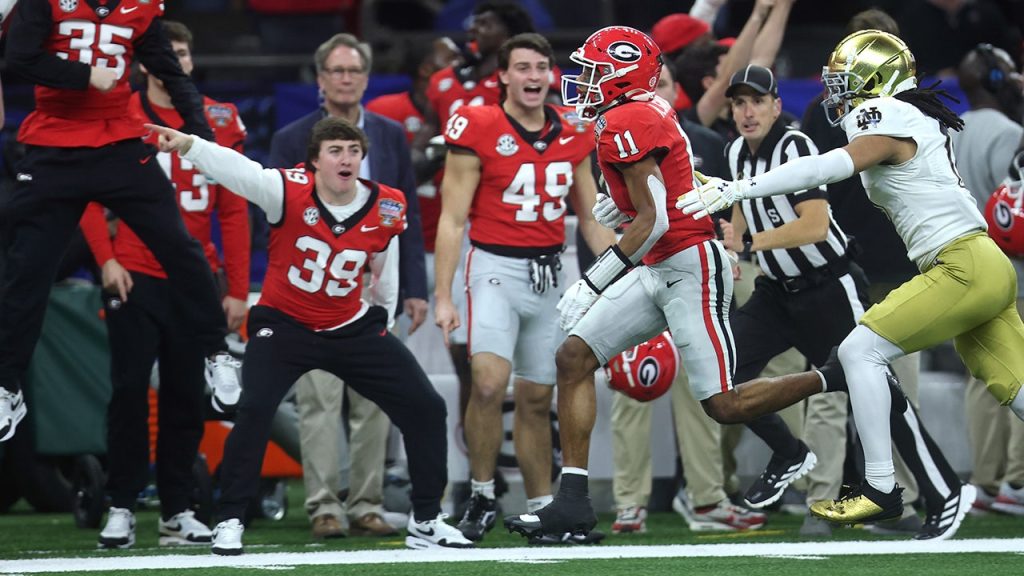The Georgia Bulldogs’ Sugar Bowl clash against Notre Dame on Thursday evening witnessed an unusual turn of events when an inactive player, Parker Jones, incurred a costly penalty for sideline interference. The incident occurred in the second quarter after a spectacular 66-yard pass play from quarterback Gunner Stockton to Arian Smith. As Smith sprinted downfield, the sideline official, keeping pace with the play, inadvertently collided with Jones, who was standing on the sidelines. This seemingly innocuous incident resulted in a 10-yard penalty against Georgia for sideline interference, significantly impacting their drive. Instead of capitalizing on the explosive play, the Bulldogs were forced to settle for a 41-yard field goal by kicker Peyton Woodring after two subsequent running plays and an incomplete pass. The bizarre penalty generated considerable buzz on social media, with many questioning the call and its impact on the game’s momentum.
Parker Jones, a redshirt sophomore cornerback from Albany, Georgia, has yet to see game action for the Bulldogs. His unintentional involvement in the sideline interference penalty brought an unexpected spotlight onto the young player who, ironically, wasn’t even participating in the game. While the penalty itself may have appeared trivial, its consequences were tangible, potentially disrupting Georgia’s offensive rhythm and costing them valuable yardage in a closely contested game. The incident highlights the importance of sideline awareness and control, even for inactive players, emphasizing that even seemingly minor infractions can have significant repercussions in high-stakes college football matchups.
The unusual penalty against Georgia became a talking point amidst a game already marked by external circumstances. The Sugar Bowl, a College Football Playoff quarterfinal matchup, had been postponed from Wednesday to Thursday evening following a tragic terror attack on Bourbon Street in New Orleans. The attack, which claimed the lives of more than a dozen people and injured several others, cast a somber shadow over the sporting event. The suspect, identified as Shamsud-Din Jabbar, drove a vehicle through a crowd, creating a scene of chaos and tragedy just a day before the rescheduled game. The postponement and the circumstances surrounding it added another layer of complexity to the Sugar Bowl, underscoring the resilience of the teams and the fans in proceeding with the game amidst such difficult circumstances.
The Sugar Bowl clash between Georgia and Notre Dame carried significant weight, being a College Football Playoff quarterfinal game, and even seemingly minor incidents like the sideline interference penalty could potentially sway the outcome. The Bulldogs, despite the setback caused by the penalty, continued to compete fiercely against Notre Dame. However, the Irish managed to score twice in the final seconds of the first half, taking a 13-3 lead into halftime. This late-half surge by Notre Dame further highlighted the importance of every play and every yard in such a crucial game, emphasizing how even a seemingly insignificant 10-yard penalty could potentially shift the balance of the game.
The bizarre penalty incurred by Parker Jones became a microcosm of the unexpected twists and turns that often characterize high-stakes football games. While the incident itself might be easily dismissed, its impact on the game’s flow and the subsequent social media reactions underscored the fine margins that often separate victory and defeat in college football. The penalty also served as a reminder of the various factors, both on and off the field, that can influence the course of a game. From player performance and coaching decisions to the emotional impact of external events and the application of sometimes controversial rules, the Sugar Bowl game became a case study in the complex dynamics of college football.
The Sugar Bowl, originally scheduled for Wednesday, was delayed by a day due to the tragic events in New Orleans, reflecting the broader impact of such incidents on sporting events. The decision to postpone the game demonstrated a sensitivity to the situation and allowed time for the community and the teams to process the tragedy. The game itself, while a significant sporting event, was played against the backdrop of a community grappling with loss and trauma, putting the football game into a different perspective. The players and coaches, while focused on the competition, undoubtedly carried the weight of the circumstances with them, navigating a delicate balance between the intensity of the game and the somber reality beyond the stadium. The Sugar Bowl, in this context, became more than just a football game; it became a symbol of resilience and a testament to the power of sport to provide a sense of normalcy and unity in the face of adversity.

